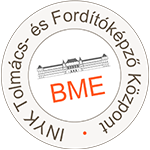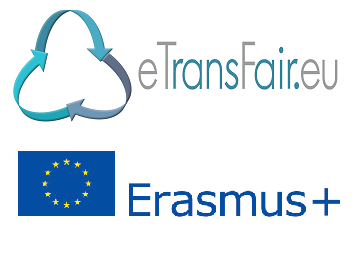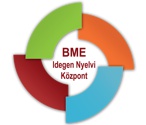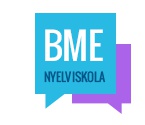Trainee Report about First Steps on the Market – a Trainees Meet Professionals event
Trainees Meet Professionals: First Steps on the Market
The guests of this event of the Trainees Meet Professionals series were graduate translators and interpreters, former BME trainees Mr Jeliszej Korcsák, Ms Laura Balku, Ms Zsófia Németh and Mr Daniel Holländer. The hosts were Csilla Szabó, Head of Centre for Interpreter and Translator Training (INYK, TFK) and Anikó Németh, Technical Coordinator of the Mentoring Scheme. In the course of the approximately one and a half hours, they shared a lot of interesting and useful information with the audience in their capacity as freelance translators and/or interpreters.
Questions:
How to get assignments and how to keep our customers?
It differs for each individual whether they translate, interpret or teach languages and whether they do these activities as a full-time or part-time job. Generally, it can be said that doing pro bono assignments before entering the market is very beneficial. These pro bono assignments can be obtained through either an internship at any non-governmental organization and they can involve a range of voluntary activities. Active participation in professional events is a great way to expand our relationship network, furthermore, it can be beneficial if you get a reputation as a translator-interpreter in a smaller community, such as a small town. Typically most graduates would start with translation assignments because here you have the opportunity to do “trial translation” and you can also receive valuable feedback. Being mobile when needed is a plus in building a clientele.
The first condition of keeping your clientele is delivering quality work. Although it may happen that (especially at the beginning of our carrier), we make mistakes, acknowledging the criticism and accepting the advice is a highly important soft skill. Appropriate self-esteem and humility are also crucial. When working with translator trainees, companies provide constant feedback, and revision which is very helpful for the trainees. And we should not forget that everyone who works on the project is human: the dynamic division of labour enhances effectiveness! It is important to note that good communication and keeping the deadlines are also highly essential.
How necessary is it to have a training to be a translator or an interpreter?
To be a specialized translator, it is a reasonable requirement to have a profound knowledge of a field, although it is typical – especially in interpretation – that we get to know certain genres on the go. The broader one’s background knowledge is the better off s/he is, and although you might have some knowledge about a particular subject, it is always better to have a professional around to ask for advice.
How widespread is the use of computer aided translation, the so called CAT tools?
There is consensus among professional translators that the use of CAT tools is inevitable. There are different kinds of tools on the market, therefore, the most common ones (in Hungary, it is MemoQ and SDL Trados Studio) are essential parts in translation centers’ curriculum. It is advised to be familiar with more than one tool. To get to know these, most of the offices help with trainings and a vast quantity of free online training material is available in this subject. If you are not familiar with CAT tool needed to complete the assignment, you should tell the office and usually, these kinds of problems can be solved easily.
Which language pairs do you work in?
In terms of conference interpreting, the direction of course is back and forth, moreover, it’s not unusual that interpretation between two foreign languages is required. The direction can be back and forth in translation as well, but more assignments are available from Hungarian to a foreign language. If the subject requires it, we work in co-operation with a language reviser.
What kind of enterprise should we undertake and how?
This is a complex question that we should leave some time to answer. As a supplementary subject, several T/I institutions – such as BME TFK – offer lectures on basic entrepreneurial skills, but with questions concerning legal and economic matters, we can turn to our acquaintances or directly to NAV. Of course, all relevant information can be found online, too, and when studying those, the fine print parts are also worth paying special attention to. As a freelance translator or interpreter, the most popular form of self-employment is the KATA taxation. (The advantages and disadvantages of this, due to the complexity of the matter, are not included in the summary).
What would you advise to the entrant colleagues?
As a summary, we want to emphasise the importance of work experience and relationship network. To broaden the latter, we encourage everyone to engage in active community life. In professional associations, e.g. the Hungarian Association of Translators and Interpreters (MFTE) and the Freelance Translators, Interpreters’ Association (SZOFT) – in the latter, even as a student, we can become a junior member.







